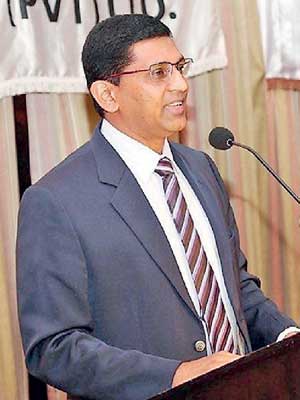24 Jul 2017 - {{hitsCtrl.values.hits}}
By Zahara Zuhair
As efficiency in border procedures is a critical factor that determines international competitiveness, implementing most of the provisions in the World Trade Organization (WTO) Trade Facilitation Agreement (TFA) for Sri Lanka is very critical, the Import Section of the Ceylon Chamber of Commerce said recently.
They said that it would improve the country’s import-exports trade and improve the much expected Foreign Direct Investment (FDI) inflows.

“We have a new hope with the WTO trade facilitation measures coming into force in February this year. Under the WTO agreements Sri Lanka is committed to implement series of trade facilitation measures committed to WTO under A,B, and C categories.
Accordingly, DG Customs and DG Commerce as co-chairs are driving this national agenda which is a high priority for the trade, which will be a game changer for the country’s international trade,” Import Section of the Ceylon Chamber of Commerce Outgoing Chairman Dinesh de Silva said at their 82nd Annual General Meeting (AGM) held last week.
Sri Lanka is a signatory of the WTO TFA, where multilateral trade was agreed in 2013 and came into force February this year.
It came into force with the ratification by two-thirds of WTO members and some estimates suggest that implementing trade facilitation reforms can bring bigger benefits for global businesses than tariff liberalization.
TFA contains provisions for the expediting the movement, release and clearance of goods, including goods in transit.
Sri Lanka has already submitted its category A commitments.
As Sri Lanka wants to plug into global value chains and become the best logistics hub in the South Asian region, efficiency in border procedures would play an important role in its success, de Silva stressed.
However, he said the countries that earlier lagged behind Sri Lanka have now overtaken the island nation in this respect, because they did not wait for the WTO TFA, but initiated reforms early on their own as they knew it was important for them to succeed in international markets and to attract FDIs.
“Sri Lanka wanted to become the Singapore in South Asia for a long time. Singapore’s success apart from many other factors is improving efficiency in doing business, which resulted in reducing time cost in that country. With those efforts, Singapore is ranked number one in world’s trade facilitation and in almost in all international key performance indicators (KPI),” he said. Meanwhile, he stressed the need for the government to create a conducive business environment for the private sector, mainly in two areas. First is to have the required legislation in place to suit the modern-day business, namely the enactment of the new Customs Law, Import and Export Control Act, Exchange Control Act, Sri Lanka Ports Authority Act and the full implementation of the Electronic Transaction Act. Secondly, to maintain consistency in all international trade related policies, which will build confidence and predictability in making business decisions and operations.
“With these two main enablers, our international trade would grow beyond doubt. These initiatives will directly help Sri Lanka’s global ranking in terms of business efficiency and ease of doing business. This needs urgent attention by the authorities as we need to move up from the low rankings,” he said.
Currently, Sri Lanka is ranked 110th place in the Doing Business Index of the World Bank among 190 economies compared to being in the 85th place in 2013, losing 25 places. The index noted that Sri Lanka on average takes 76 hours on average to comply with export documentary requirements compared to 11 hours in Thailand, 38 hours in India and 50 hours in Vietnam.
He noted that between 2014 and 2016, the country’s global ranking in terms of business efficiency, transparency of border administration measured by the Global Trade Enabling Index, went down by ten places from 87th to 97th out of 136 countries.
de Silva said that it is important to move the economy towards e-commerce and digitization, as global e-commerce is growing leaps and bounds, particularly among emerging markets.
07 Jan 2025 2 hours ago
07 Jan 2025 2 hours ago
07 Jan 2025 3 hours ago
07 Jan 2025 5 hours ago
07 Jan 2025 5 hours ago